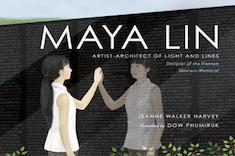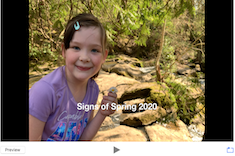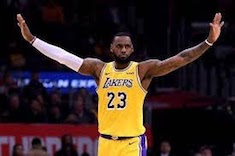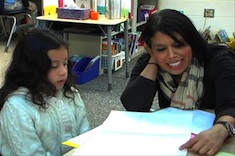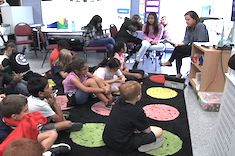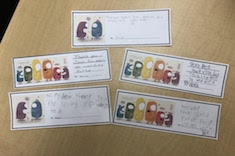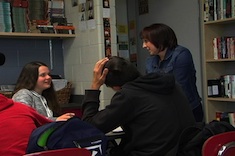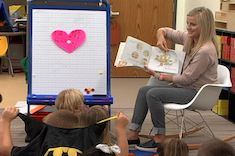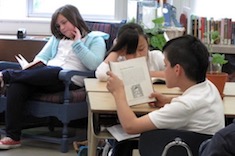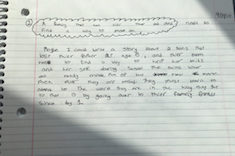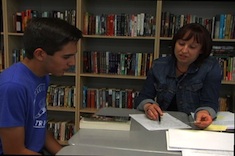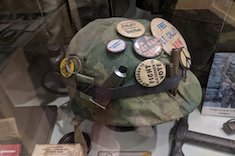Library
Choice Literacy Articles & Videos
The Choice Literacy library contains over 3,000 articles and 900 videos from 150+ contributors. Classic Classroom and Literacy Leadership subscribers have access to the entire library. Content is updated continuously, with five to six new features published each week.
Latest Content
Meet Someone New Monday: Using Picture Book Biographies to Bring Marginalized Voices into the Classroom
Melissa Quimby creates “Meet Someone New Monday” to inspire students with picture book biographies of little-known artists, activists, and citizens who accomplish remarkable feats.
Flipping Literature Discussions
Gretchen Schroeder realizes her experiences from decades ago as a student are clouding her perspective on “flipped” literature discussions. Once she gets over her biases, she finds that online discussion of literature is a powerful equalizer for student voices.
August 28, 2020 Don’t Talk About My Writing Without Me
Giving feedback online is the focus of this week’s newsletter.
Building Online Writing Groups
Leigh Anne Eck lists critical questions teachers might ask themselves as they build online writing communities where everyone is comfortable giving and receiving feedback.
Using Photographs in Remote Learning Communities
Bitsy Parks shares how she and her first-grade students used photography to bridge the distance between home and school this spring, learning lessons she is using this fall in remote learning contexts.
Three Things Digital Tools Have Taught Me About Feedback
Christy Rush-Levine discovers that a move to digital feedback reveals many important truths about her middle school students, including insights into the effect of grades on how learners view response to their work.
August 21, 2020 Future Focused
This week we look at how to build and sustain remote learning communities.
Partner Reading: Quick Share
Gigi McAllister has two reading partners in her fourth-grade classroom do a quick practice of retelling their stories.
Sustaining (Not Just Building) Community Online
August 14, 2020 A Place for Wonder
We look at how to help students differentiate between fact and fiction in this week’s newsletter.
Poetry Resources for Remote Learning
Poetry can be the glue that holds many virtual classroom communities together. It works for quick morning meeting openings, transitions, or even a bit of laughter when energy is flagging. Cathy Mere shares her favorite poetry resources for remote learning.
Fact or Fiction?
Suzy Kaback works with students to create a “fact or fiction” class book to explore the boundaries between truth and fantasy.
First-Grade Conference: Information Writing
Stella Villalba confers with Esmeralda about her information writing on blue jays.
Letting Students Organize Informational Books
Mandy Robek is a little nervous about setting her students loose to organize informational texts, but she couldn’t be more pleased by what they learn in the process.
August 7, 2020 Slow Down to Be Kind
We look at building kindness and community in this week’s newsletter.
Reading Minilesson: Theme
Dana Murphy leads a reading minilesson on theme in fifth grade, explaining how students might think more deeply about themes through characters’ problems.
Routines for Building Gratitude
Bitsy Parks finds even the dreariest days in her first-grade classroom are infinitely more enjoyable because she’s built in routines for expressing gratitude.
Management and Middle School Workshops
Christy Rush-Levine lowers the tension level in her class over management issues by moving from irritation to curiosity, using her “inner chimpanzee” voice.
July 31, 2020 The Importance of Routines
We look at routines and structures for learning in this week’s newsletter.
Lessons and Minilessons: What’s the Difference?
What’s the difference between a lesson and a minilesson? Christy Rush-Levine finds that flexibility is just as important as length in making minilessons work well.
Planning Writing in Kindergarten
Hayley Whitaker leads a minilesson in kindergarten on how to plan a narrative writing draft.
Varying Workshop Structures to Meet Student Needs
Tara Barnett and Kate Mills give guidance and support for varying the structures and routines in literacy workshops.
July 24, 2020 Christmas in July
We look at ways to learn student names and honor their history early in the year in this week’s newsletter.
First Grade Minilesson: Connections
Melissa Atwood leads her first-grade class with a minilesson early in the school year on making connections to text.
Picture Books for Persona Poems
Gretchen Schroeder uses picture books to help her high school students understand and write persona poems.
Call Me by My Name
Suzy Kaback reminds us that the language we use to talk about challenging students shapes our perceptions of them. That’s why she has moved to calling students “small teachers.”
July 17, 2020 Walking Tours
We look at ways to teach realistic and historical fiction in this week’s newsletter.
Sparking Ideas for Realistic Fiction
Tara Barnett and Kate Mills explain how they use examples from YA authors of how to mine everyday life for powerful ideas. They then help students move from ideas to blurbs as they start their realistic fiction drafts.
Conferring over Motivation and Genre
Christy Rush-Levine confers with Griffin over his reading responses. They consider the differences between dystopian literature and realistic fiction, as well as what motivates characters.
Building Interest Through Artifacts
Mark Levine has many students who haven’t traveled much more than 100 miles from home. He makes history come to life for them by bringing artifacts into his middle school classroom.
Browse Content By
Type
Category
- Assessment Tools
- Big Fresh Archives
- Booklists
- Choice Numeracy
- Classroom Design
- Common Core
- Community Building
- Conferring
- Content Literacy
- Digital Literacy
- English Language Learners
- Equity
- Family Relations
- Free Samples
- Guiding Groups
- Leadership
- Literacy Coaches
- Mentor Texts
- Minilessons
- New Teacher Mentors
- Podcasts
- Poetry
- Quote Collections
- Reading Strategies
- Self Care
- Struggling and Striving Learners
- Talking and Listening
- Teacher Study Groups
- Teaching Reading
- Teaching Writing
- Word Study and Vocabulary
Author
- Melissa Quimby
- Nawal Qarooni
- Gwen Blumberg
- Julie Cox
- The Lead Learners
- Hannah Tills
- Josie Stewart
- Ruth Metcalfe
- Mallory Messenger
- Becca Burk
- Jodie Bailey
- Vivian Chen
- Mary Brower
- Tiffany Abbott Fuller
- Stephanie Affinito
- Ruth Ayres
- Leigh Anne Eck
- Heather Fisher
- Shari Frost
- Julie Johnson
- Suzy Kaback
- Gigi McAllister
- Shirl McPhillips
- Melanie Meehan
- Cathy Mere
- Debbie Miller
- Tara Barnett and Kate Mills
- Tammy Mulligan
- Dana Murphy
- Bitsy Parks
- David Pittman
- Brenda Power
- Heather Rader
- Matt Renwick
- Mandy Robek
- Christy Rush-Levine
- Gretchen Schroeder
- Jen Schwanke
- Brian Sepe
- Katherine Sokolowski
- Stella Villalba
- Jennifer Vincent
Grade Level
Choice Literacy Membership
Articles
Get full access to all Choice Literacy article content
Videos
Get full access to all Choice Literacy video content
Courses
Access Choice Literacy course curriculum and training

